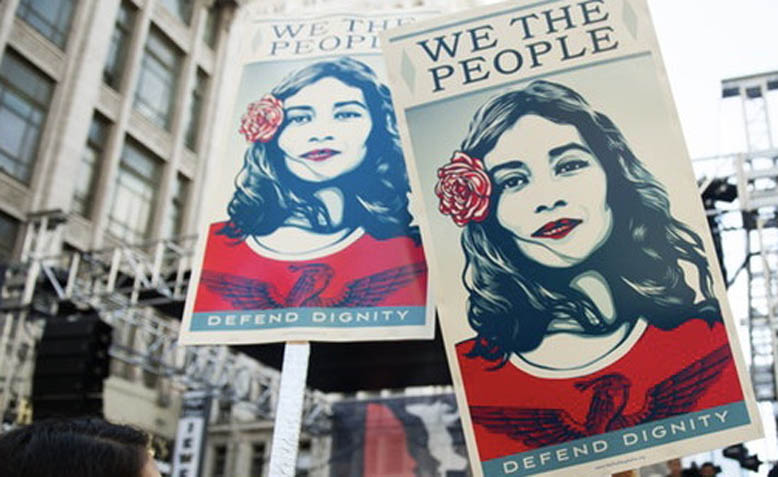 Los Angeles Women's March 2017. Photo: Emma McIntyre/Getty Images Entertainment/Getty Images
Los Angeles Women's March 2017. Photo: Emma McIntyre/Getty Images Entertainment/Getty Images
In the trans debate we need less heat and more light, argues Kristina Jayne Harrison
We transgender people are oppressed by societal negation of our personalities, by abuse and by systemic discrimination arising from our transgression of gender norms. These norms attempt to control and prohibit behaviours according to an individual’s sex. They are behavioural straitjackets which have evolved to keep women in their place and men ready for work and warfare. Children whose natural traits, interests and sexualities fall outside the norms imposed on their sex, experience ridicule and rejection precisely because their sense of self does not match these artificial expectations being dictated because of their genitals. Many children begin to identify with, or in the age of social media as, the opposite sex. Much of human behaviour can only be expressed with social ‘legitimacy’, even safety in some cases, by one sex or the other. These rigid gender binaries are policed by shaming, discrimination and violence. Men who wear bright red lipstick will not get the job at the interview, will feel the glare of hostile eyes, hear the occasional shouts of abusive hate and in certain areas or certain times will even feel the boots of (overwhelmingly) male bigotry.
What rights can we legitimately fight for?
We have the fundamental right to equality, to safety from violence and discrimination. We need prompt, properly funded services, support and treatment as much as any other patient group. The current wait of up to five years for legal recognition is cruel and unacceptable, the system is demeaning and needs reform. Specialist services must include sexual health, homelessness, domestic violence and rape crisis provision for all who need it, whether in mixed trans/female units or in separate amenities. Some of the controversy around all-women shortlists has also highlighted the need for positive discrimination to help correct the political under-representation of trans people. However, where additional seats or positions cannot be created these should be taken from men, not from oppressed women still struggling against their own under-representation.
We should be advancing legal protection for everyone’s right to free gender expression whether at work, at home or elsewhere. This would expand freedoms for all citizens and help better protect all gender non-conforming people. Central to protection for all is a choice of safe, single-sex and unisex toilets as well as changing rooms. Transsexuals undergoing gender reassignment should continue to campaign to reaffirm our current legal protections. These enable post-op transsexuals to be treated broadly the way we wish to be treated and to live with dignity. Campaigning to maintain consent is fundamentally different from demanding (as a right) spaces which belong to women and over which women must have control if they as a distinct biological sex are not to be subordinated to the priorities of people born male.
Importantly, trans people have the right to challenge oppressive gender norms. The overwhelmingly male-dominated economic system, its defenders in parliament and outside it, in newspapers, advertising, film and television are the primary forces perpetuating these ‘roles’. The buttressing or policing of these constraints by them and others, including bigoted male bullies and families influenced by these ideas. is at the heart of anti-trans prejudice and violence. Only when artificial gender restrictions are scrapped will future generations of children be free to develop their personalities and interests regardless of their genitals and in a truly life-affirming, body-affirming way.
One ‘right’ we don’t have is to distort or ignore biology to insist we belong to a category from which our genes and our socialisation irrevocably exclude us. I can never experience female biology or all those related issues which have been at the heart of the discrimination and struggles women face. Neither can I ever know the profound and foundational experience of girlhood socialisation which forms the mental and emotional prism through which adult women synthesise their experiences. To pretend these things don’t matter is to obliterate the biological reality of sex and undermine the unique experiences and rights of women. If you’re blind to sex, blindness to sexism follows as a recent tweet by young Labour transwoman, Lily Madigan confirms. “asking for women’s spaces free from trans women (a right enshrined in the Equality Act) is transphobic” according to her.
Yet we’re a tiny and highly vulnerable minority. It’s inconceivable that we can make meaningful and lasting advances at the expense of women. More likely, self-identity will entrench a permanent conflict with women who as people also oppressed by gender roles, could and should be our natural allies. Instead, bitterness among women is growing and risks becoming associated with the left. If that continues it could open the door to a vicious right-wing backlash.
The vultures of the right-wing gutter press are circling. They are falsely posing as defenders of women, children, free speech and rationality, better to scapegoat trans people. A quick glance around Europe at the rise of the far right shows that this is a very dangerous state of affairs. We urgently need the leadership of the Labour Party to fully address this issue and grasp the nettle. To rescind premature policy decisions on self-identity and firmly take control of this situation to facilitate an open, respectful national conversation which asks the following fundamental question. How, whilst respecting the autonomy of different groups can we advance the lives, rights and services of trans people, of women and of all gender non-conforming people and lay the basis for future solidarity between these groups, not bitter enmity?

